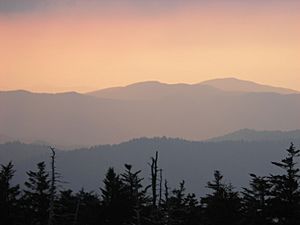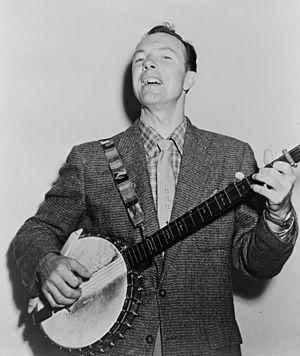On Top of Old Smoky facts for kids

"On Top of Old Smoky" (often spelled "Smokey") is a traditional folk song of the United States. As recorded by The Weavers, the song reached the pop music charts in 1951. It is catalogued as Roud Folk Song Index No. 414.
Contents
Emergence of the song in popular music
Cecil Sharp collected Appalachian folksong just before the time when this music came to be "discovered" by the outside world and sold as a commercial product by the nascent recording industry (this development would ultimately create the modern genre of country music). The first to make a commercial recording of "On Top of Old Smoky" was George Reneau, "The Blind Musician of the Smoky Mountains," who worked as a busker in Knoxville, Tennessee, just west of the Appalachians. Reneau made the trip to New York City to record the song, and others, for Vocalion (Vo 15366) in 1925. His version of "On Top of Old Smoky" used the alternative tune noted above.
In the 1940s through the mid 1960s, the United States experienced a folk music revival, in which Pete Seeger was a leading figure. His music—some of it drawn from scholarly sources like Sharp—was popular and was disseminated widely in commercial recordings. Seeger modified a version of "On Top of Old Smoky" that he had learned in the Appalachians, writing new words and banjo music. He said that he thought that "certain verses go back to Elizabethan times." The sheet music for the song credited Seeger for "new words and music arrangement".
The Weavers, a folksong singing group that Seeger had co-founded, recorded a very popular version of the song using Seeger's arrangement on 21 February 1951. It was released by Decca Records as catalog number 27515. It reached No. 2 on the Billboard chart and No. 1 on the Cash Box chart, and sold over a million copies. The song also became one of Burl Ives' signature songs, with his recording reaching No. 10 on the Billboard chart in 1951.
The enormous popularity of these recordings (and others following in their wake; see below) led to the curious situation of the song re-attaining folk status; it is one of the few songs that most Americans know from childhood, and many are unaware of the mid-century recordings that promulgated it so widely.
Other modern versions
Following its reintroduction to America by the Weavers, the song became a standard item of popular music, sung by luminaries such as Bing Crosby, Perry Como, Percy Faith, Gene Autry, as well as (in a brief excerpt) Elvis Presley. A great many versions followed in the ensuing decades. The following list is ordered chronologically.
In 1951, Swedish revue group Flickery Flies with Brita Borg recorded a Swedish version. This was during a time of collaboration with showbiz impresario and songwriter Povel Ramel who in a revue paraphrased it as Högt uppe på berget, jag har till en vän, förlorat en femma, jag lär nog aldrig se den utigen (High up on the mountain, I have to a friend, lost a 5 kronor bill, I doubt I'll see it again) .
Dave Van Ronk included the song on his album The Mayor of McDougal Street: Rarities 1957–1969. This version sounds much more Celtic in nature, with more vocal ornamentation and a looser rhythmic structure.
Television host Jack Narz recorded the song for his album Sing the Folk Hits With Jack Narz in 1959.
In The Many Loves of Dobie Gillis episode #3.13 "Blue-Tail Fly" (ca. 1961), Dobie, Zelda and Maynard use the tune and change the lyrics to "The Name's Dobie Gillis" to use as Dobie's campaign song for his student council election bid.
Bing Crosby included the song in a medley on his album 101 Gang Songs (1961)
Harry Belafonte recorded a version on his 1962 album The Midnight Special. On the sleeves notes it states; 'He wrote and tried out OLD SMOKEY during his 1961 summer tour'.
Alvin and the Chipmunks covered the song for their 1962 album The Chipmunk Songbook.
In Germany, the tune of the song was used as the chorus to singer Manuela's hit single "Ich geh' noch zur Schule" in 1963. The recording, though, had nothing to do with the traditional heritage of the original song: "Ich geh' noch zur Schule" (meaning "I Still Go to School") tells the story of a teenage girl denying the tempting offers of a talent scout, claiming she wants to finish school first, but she might agree to a recording contract the following year after her final exams.
Little Eva, singer of "The Loco-Motion", recorded a version called "Old Smokey Locomotion" (1963), with lyrics describing how the residents of Old Smokey caught on to The Locomotion.
In 1964 during Beatlemania, Al Fisher & Lou Marks had "Paul George John And Ringo (All The Way to the Bank)" sung to the "Old Smoky" tune (Swan LP-514).
On the 1978 Sesame Street album, Bert & Ernie Sing-Along, Grover sings a version of the song, but changes the lyrics to something about him losing his clothes, lunch, various other belongings, and his way home, but eventually finding his way home and finding his mother with all the stuff he sang about losing.
In 1978, "On Top of Old Smokey" was released by Swedish pop group ABBA (with lead vocals by Frida) as part of a medley that also included "Pick a Bale of Cotton" and "Midnight Special". The medley featured as the B-side to the group's single "Summer Night City".
Bruce Springsteen performed the song in Portland, Oregon a few months after the 1980 eruption of Mount St. Helens as a tribute during The River Tour.
In a 1990 episode of the American television series Twin Peaks, "Big Ed" Hurley (Everett McGill) sings the song to his hospitalized wife, Nadine (Wendy Robie).
Fans of the English football side Notts County FC have sung the song during games, to the words 'I had a wheelbarrow, the wheel fell off' since 1990.
In 1991, Swedish comedy group(s) Galenskaparna och After Shave performed a variant in their "Grisen i Säcken" revue.
Alternative country band The Gourds gangstered the lyrics to "On Top of Old Smoky" in the song "I'm troubled" on their 1998 release Gogitchyershinebox.
Use in classical music
In 1953, Ernő Dohnányi used the tune (and also two other traditional American folktunes) in his final composition American Rhapsody.
Images for kids



